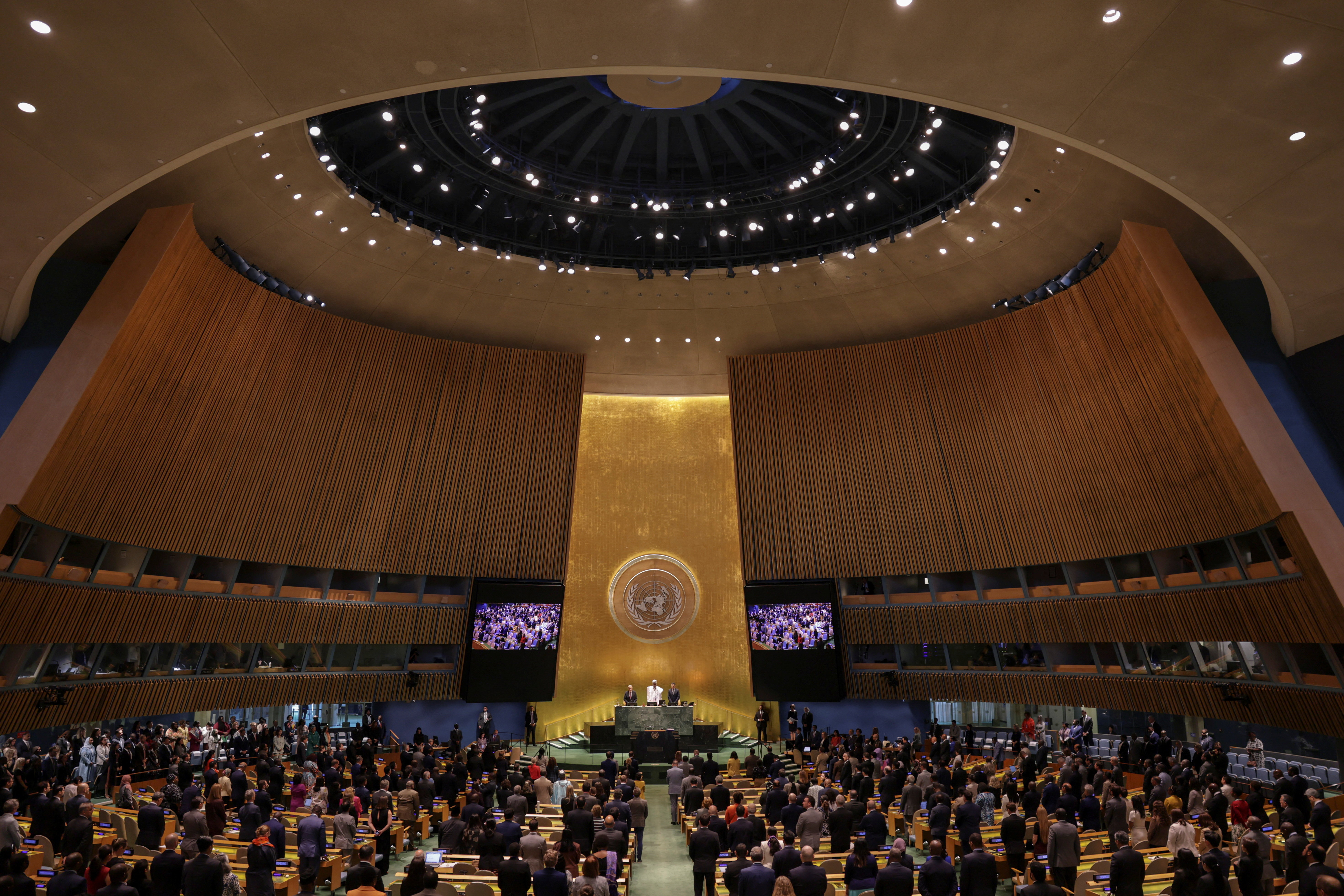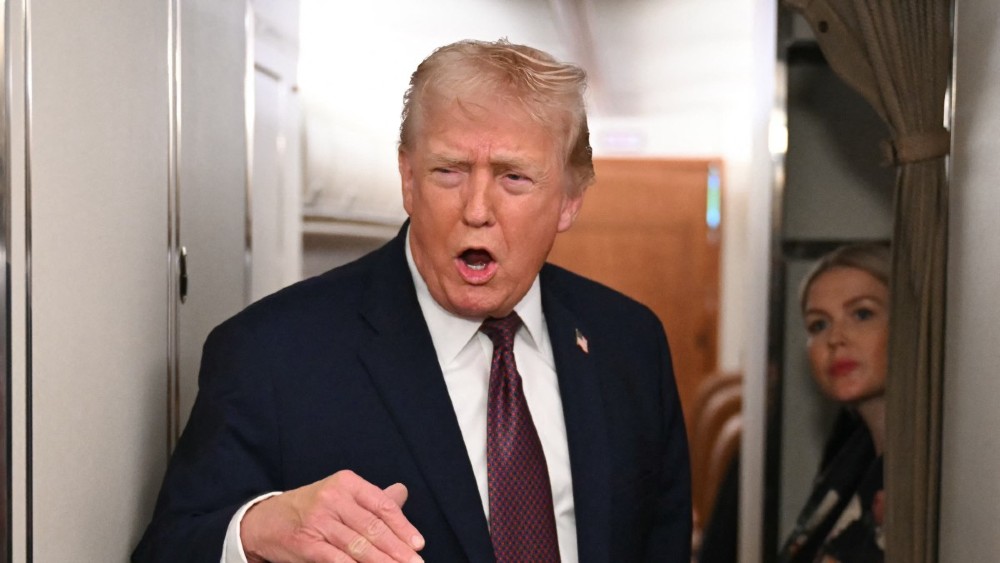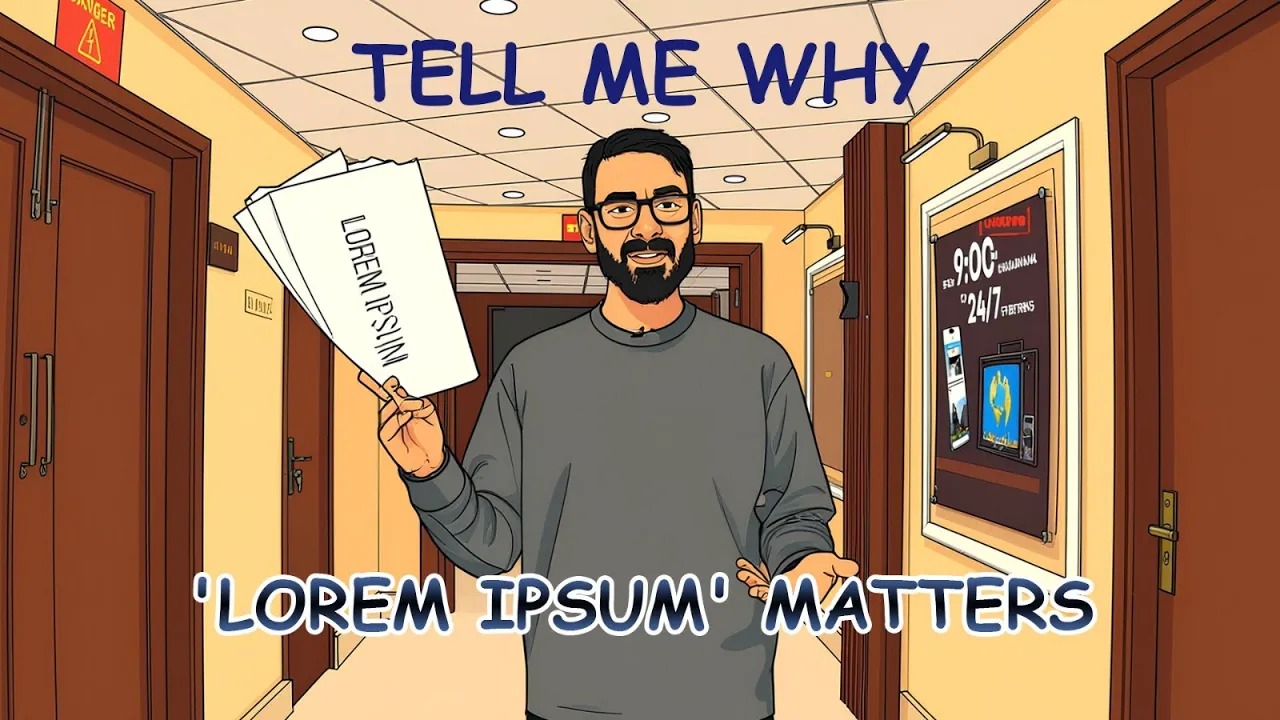
People have a moment of silence during the 79th Session, 96th plenary meeting at U.N. headquarters in New York City, U.S., September 9, 2025. (REUTERS)
WASHINGTON: The world’s eyes are on the United Nations as the UN General Assembly, scheduled for September 22 in New York, aims to address the long-standing Israeli-Palestinian conflict.
This comes amid ongoing violence in Gaza, where over 65,000 Palestinians have been killed. The conference seeks to revive efforts for a two-state solution, which proposes separate states for Israel and Palestine.
The diplomatic momentum toward a two-state solution gained a significant boost when the United Kingdom (UK), Canada, and Australia recognized Palestine as a state on Sunday. This move defied opposition from Israel and the US, signaling a shift in Western foreign policy toward supporting Palestinian statehood.
British Prime Minister Keir Starmer made the announcement in a televised address, writing on X, “Today, to revive the hope of peace for the Palestinians and Israelis, and a two-state solution, the United Kingdom formally recognizes the State of Palestine.”
Canada followed suit, with Prime Minister Mark Carney emphasizing Canada’s commitment to peace: “Canada recognizes the State of Palestine and offers our partnership in building the promise of a peaceful future for both the State of Palestine and the State of Israel.”
Australia, too, formally recognized Palestine as an “independent and sovereign” state. Prime Minister Anthony Albanese stated, “This recognition reflects Australia’s longstanding commitment to a two-state solution, which has always been the only path to enduring peace and security for both Israeli and Palestinian peoples.”
Palestinian Foreign Minister Varsen Aghabekian Shahin praised the recognition, saying, “Countries recognizing a Palestinian state this week are taking an irreversible step that preserves the two-state solution and brings Palestinian independence closer.” She added, "It might not end the war tomorrow, but it's a step forward, which we need to build on and amplify."
UN Conference: Will it make a difference?
The UN conference, co-chaired by Saudi Arabia and France, is seen as a continuation of earlier discussions aimed at a peaceful resolution. UN Secretary-General Antonio Guterres expressed regret that the two-state solution appeared “farther than ever” amid ongoing hostilities. Despite this, the conference holds significant potential, particularly given Saudi Arabia's increasing diplomatic influence.
Dr. Kamran Bokhari, senior director at The News Lines, told Pakistan TV, “While this conference may be largely symbolic, it brings together both Western and Arab nations at a time when the Gaza war and Israel's international standing are reshaping Middle Eastern politics.” He added that Saudi Arabia’s co-chairmanship “underscores Riyadh’s efforts to bridge Arab and Western positions.”
Pakistan, which has long been a strong advocate for Palestinian rights and has condemned Israeli military actions, will play a crucial role in the conference. Prime Minister Shehbaz Sharif will lead Pakistan’s delegation at the UNGA, where he is expected to emphasize Pakistan's position on Kashmir and Palestine. His address will focus on the ongoing humanitarian crisis in Gaza and call for urgent international action.
In an exclusive interview with Pakistan TV, Dr. Bokhari said, “Pakistan’s role in this conference is significant. Its position as a non-permanent member of the UN Security Council amplifies its diplomatic leverage, particularly on the Palestinian issue.”
Challenging path to peace
Although international recognition of Palestine is a positive step, many remain skeptical about the conference’s effectiveness in achieving lasting peace.
Dr. Hassan Abbas, professor of International Relations at the Near East South Asia Center for Strategic Studies, told Pakistan TV: “The countries opposing the two-state solution over the past two years wield significant global political power.”
“Without their positive participation, this initiative will likely fail to materialize,” he added.
The US has repeatedly vetoed UN resolutions on the Israeli-Palestinian conflict, citing concerns over Hamas and Israel’s security.
Dr. Bokhari noted that Saudi Arabia’s role is crucial in bridging gaps between pro-peace nations and those opposing the two-state solution.
“The KSA’s co-chairmanship could serve as a bridge between countries supporting Palestinian statehood and those who believe it will empower Hamas,” he said, referring to the 2020 Abraham Accords between Israel and several Arab nations.
Pakistan’s diplomatic strategy
Pakistan’s unwavering support for Palestine remains a cornerstone of its foreign policy. With its recent defense pact with Saudi Arabia, Pakistan’s influence in the region continues to grow.
Dr. Bokhari said, “Pakistan’s role as a moral advocate for Palestine, alongside its growing diplomatic ties with Saudi Arabia, positions it as a key player in shaping the future of the Israeli-Palestinian conflict.”
As the UNGA approaches, the fate of the Two-State Solution remains uncertain. While the growing recognition of Palestine offers hope, it is unclear whether this will be enough to secure a lasting peace.
However, the active participation of countries like Saudi Arabia, Pakistan, and France underscores the international community’s commitment to resolving the conflict. The coming days may prove pivotal in determining whether a lasting peace is possible for Israel and Palestine.
Latest News
‘Meeting being set up’ with Iran, but we may act first, says Trump
AN HOUR AGO

Trump says working well with Venezuela's new leaders, open to meeting
2 HOURS AGO
.jpg)
Meta urges Australia to change teen social media ban
2 HOURS AGO
.jpg)
Tell Me Why: Lorem Ipsum matters
2 HOURS AGO

Arts festival faces exodus after dropping Palestinian Australian author
3 HOURS AGO
.jpg)
